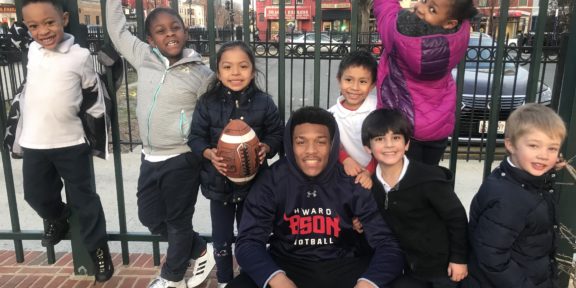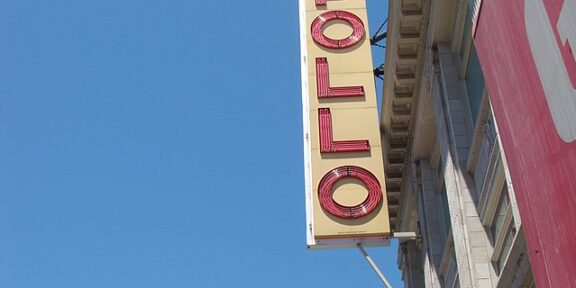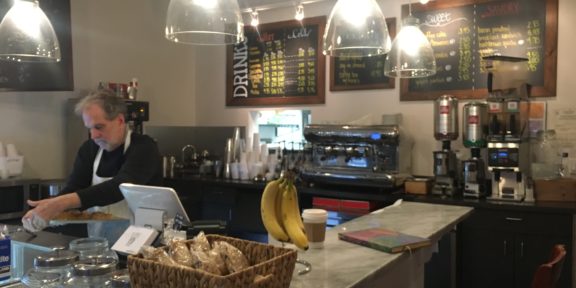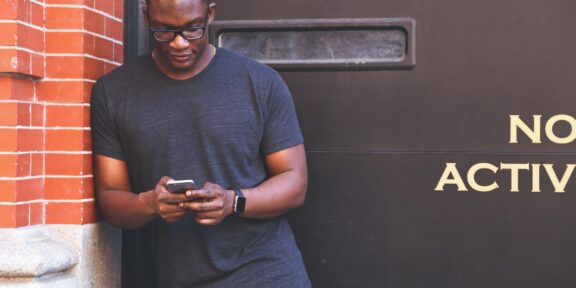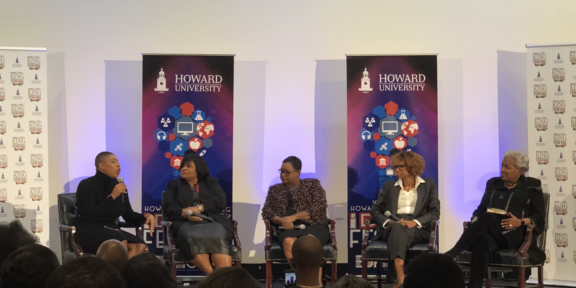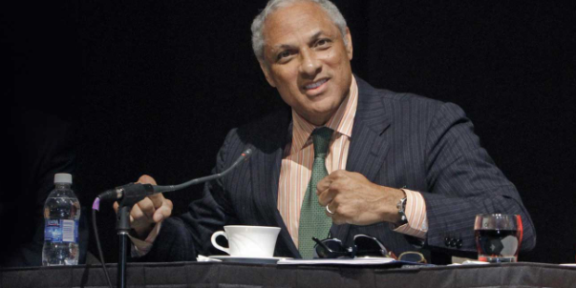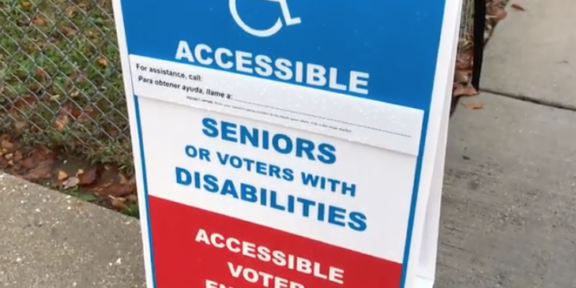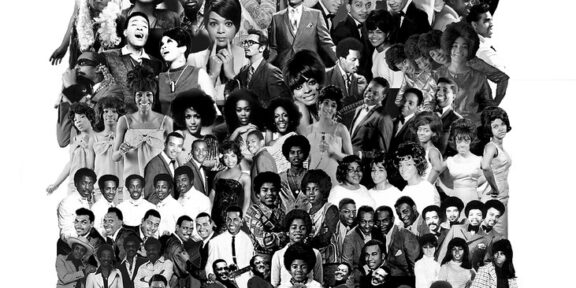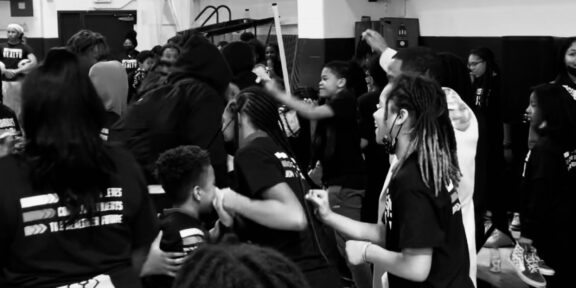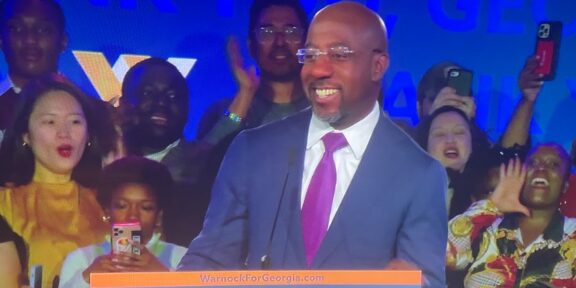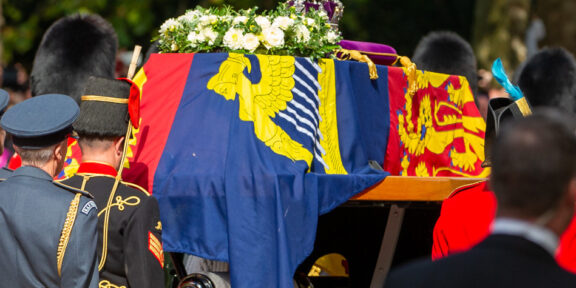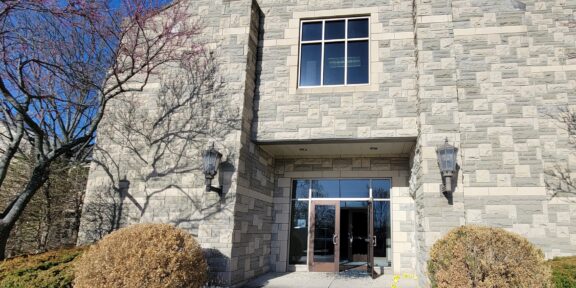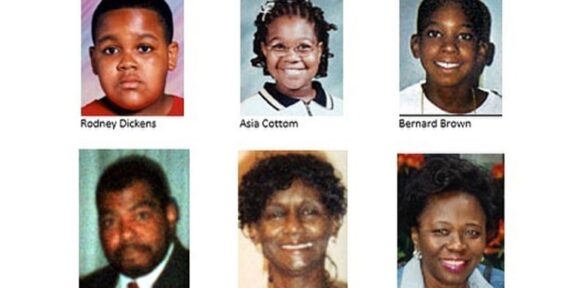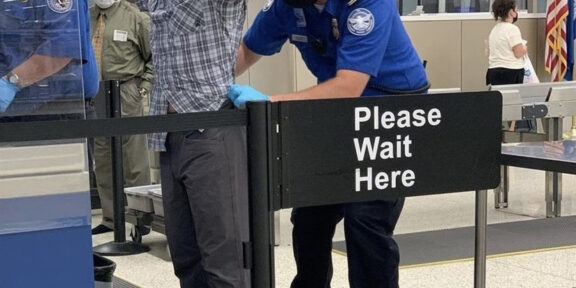
When many people think back to a moment where they knew exactly where they were and what they were doing, they gravitate toward 9/11 — a day that America will never forget.
Sept. 11, 2001, started off as a normal day for people from all walks of life. By 8:46 a.m., a hijacked plane hit the North Tower at the World Trade Center and then a second at the South Tower about 15 minutes later. Within a half-hour, a third plane struck the Pentagon just outside Washington, and a fourth crash-landed in Shanksville, Pa., after the passengers attempted to intervene in the hijacking.
The coordinated terrorist attacks left more than 3,000 dead — not only those on the planes, but also public servants and civilian bystanders. Scores of others have spent nearly two trying to heal physical and psychological wounds.
The attacks are seared into the nation’s collective memory, especially for those over the age of 25 who remember 9/11 like it was yesterday and have pledged to never forget.
As the United States commemorates the 18th anniversary of 9/11, some of them share their experiences through the vignettes below. an article on an elementary school’s annual celebration of life and a feature on the Flight 93 National Memorial in Pennsylvania.

First Responder
As a member of the Crisis Action Team for the U.S. Army, Major Tyree Webster and his comrades had received news of the Twin Towers being hit. Moments later, he became a firsthand witness of American Airlines flight 77 crashing into the Pentagon.
From his vantage point at a bus stop allowing clear sight, he saw “fireballs going up” from the thunderous crash. Amid the ensuing chaos, a car blew up in front of the State Department.
Without access to the Emergency Operations Center, Webster helped to execute a response and send an Army Reserve official to represent the Crisis Action Team. He was honored for his courage and participation in relief efforts.
— Spencer Green
A Giant Ball of Fire
One of Michael Perry’s close relatives was working in the Pentagon when the plane flew into the building. She described hearing an explosion from her cubicle. When she got up to investigate the commotion, a giant ball of fire headed toward her and she immediately started running to escape.
After surviving this terrifying event, she began to watch Westerns and old films to avoid non-stop coverage of the attacks. She still watches Westerns to this day.
Perry also said that she was triggered by the earthquakes that shook the D.C. area in 2013, because it reminded her of the 9/11 attacks.
— Steven Aldridge
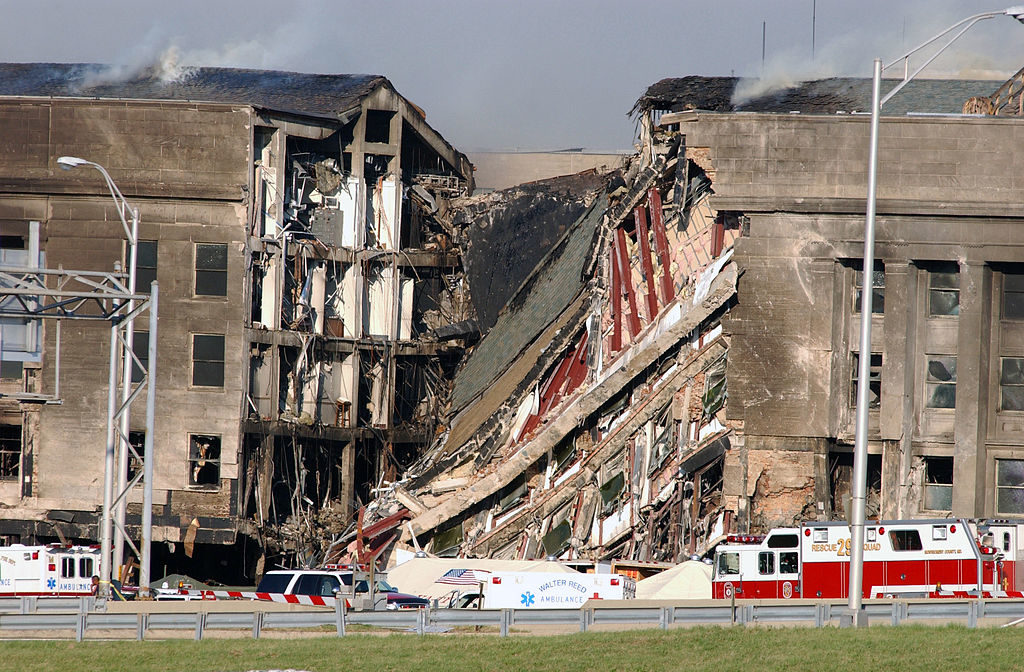
‘Everyone Was in Panic Mode’
For Johnnie Harris of Washington, 9/11 was personal.
“I have a first cousin who worked at the Pentagon not far from where the plane crashed,” Harris said. “Since that day, she has never been able to go back into the building. She retired on that day.”
“I was right in the shop looking at the smoke from the Pentagon,” Harris said. “ I couldn’t believe it was happening.”
Donald James of Washington recalls the views of the Pentagon crisis.
“I was coming to work that day,” James said. “I live in Springfield and I saw actually — it was chaos. I seen a lot of smoke from the Pentagon. I seen like a million and one police that day. Everyone was in panic mode during that time.”
James talked about how it took over, from the streets to the news. “I knew something was going on, because so many police cars were driving by,” he said. “They were going so fast, and when you turned on the news it was on all the news channels.”
— Lauryn Forbes
A New Way of Life
Brandon McManus, a 30-year-old D.C. native, said that he was in health class at Virginia High School when the intercom suddenly cut on to inform the students of the attacks. Since the location of the school was relatively close to the Pentagon, the students were ordered to gather in the auditorium until their parents came to pick them up. Many of the students’ parents were caught up in the chaos, according to McManus.
“A friend of mine, his dad was a police officer at the time, and he got the call to go down there. But luckily we [saw] him when he came home,” McManus said. “One of the girls that was in my school at the time, her father was a firefighter. She actually lost her father that day.”
Mohamed Osman, 33, of Virginia was affected by the public’s response after the catastrophe.
“It made it hard for me, as a person named Mohamed,” Osman said. “Whenever we traveled, we’re always randomly checked.”
— Nancy Vu
‘Why Are You Here?’
Danielle Coker, 23, a student at Howard University, and her family immigrated from London to Maryland around the time of 9/11. She recalls a culture of interrogation from her new neighbors, classmates and teachers alike that made “transitioning into a new country a lot harder.”
She received remarks like “who are you?” and “why are you here?”
Some American citizens went beyond the pop-culture comfort of freedom fries, liberty cabbage and hot dogs to mend the trauma of the deadliest terrorist attack in U.S. history. They acted as private investigators and conspiracists, placing blame on immigrants and minimizing global politics.
After Sept. 11, hate crimes against people of Middle Eastern descent increased from 354 attacks in 2000 to 1,501 attacks in 2001, according to the Arab American Institute.
Following the 1995 Oklahoma City bombing, “more than 200 serious hate crimes were committed against Arab Americans and American Muslims,” stated an article in the Journal of Applied Psychology. However, a white domestic terrorist, Timothy McVeigh, who had served in the U.S. Army, was convicted in the bombing,
Many Americans say the War on Terror that President George W. Bush initiated after 9/11 also needs a domestic focus, given that white nationalists reportedly claimed 22 lives in El Paso, Texas, 11 in Pittsburgh, and nine in Charleston.
— Jaylin Ward
A Sense of Community on Campus

Kristen Williams, a 2005 alumna of Howard University, thinks about 9/11 all the time. She recounted the day in vivid detail.
“I woke up to get ready for a 9:40 a.m. class, and I was watching ‘Good Morning America,’” Williams said. “As I watched, I saw the second plane hit on live TV. It didn’t register to me that we were under attack. I thought it was just an incident in New York.”
Williams caught the shuttle from the Meridian dormitory on 16th Street to the main campus. By the time she arrived, a plane had struck the Pentagon.
“Nobody was really in class; everyone was on the yard,” Williams said. “By that point, you could see the black smoke from the Pentagon.”
A native of Flint, Michigan, Williams began looking for familiar faces in the crowd and saw her hometown friend, Pilin. “We ran to each other. We didn’t know if they were coming to campus next; we just wanted to go home.”
Panic arose because calls weren’t going in or out. “Nobody could call me for hours, and I couldn’t call them. The lines were so busy; I couldn’t reach anyone till later that day.”
Afterward, Howard grieved along with the rest of the country.

“I went to class either the next day or the following day, and the teacher never showed up,” Williams said. “We went back on Friday. Someone from the department met us and told us the professor wouldn’t be back as his wife had died in the attack at the Pentagon. He took the rest of the semester off, and I don’t know whatever happened to him.”
Eighteen years after that day, the weight of the tragedy is still with her. “I think about that day all the time,” Williams said. “I can remember my emotions and what was going on in my mind exactly.”
Yet she says everyone came together that day, sharing cell phones if they worked, crying on each other’s shoulders and calming down people who were nervous as they all stood on the yard.
“There was a real sense of community that day.”
— Jaylen Williams
Military Memories
Yakeem Jones, 44, was stationed at an Air Force base in Dover, Delaware, when the first plane hit. Everyone thought it was an accident. Once the second plane hit, they knew it was an attack.
“Everyone went completely quiet; no one said anything for a good two minutes,” Jones said. “We could not believe what we were watching.”
As a service member, he had to stay at work until the next day at 7 p.m. The event was so traumatic that no one was actually working, Jones recalled. Their eyes were glued to the TV.
“We knew nothing would be the same after this,” he said. “It felt like it was the end of the world.”
While Jones was stuck on work, Lee Drummond, 48, couldn’t get back on his Air Force base in Montgomery, Alabama, after leaving to pick up supplies for the office. When he returned, the base was locked down. Nobody could get on a military base anywhere.
At first, Drummond was confused and had no idea why the base was shut down. He could not get any information about what happened through his job. So he heard about the attacks when he went home. He tried to call a relative who lived in New York, but there was no cell phone service.
Drummond believes that it is important to keep this day alive to remember everyone who lost their lives. He also said that 9/11 scared everyone to death and that the American people are still traumatized by the events that transpired.
— Corrin Jones
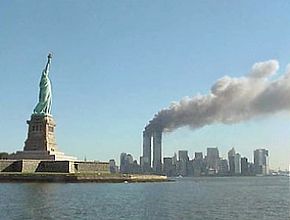
‘Safe and Sound’
Clifford Patterson was working at a post office in Queens when 9/11 took place. He was concerned about two of his four children who attended school in Lower Manhattan.
“By the grace of God, they were home or at least near to where the attack wouldn’t harm them,” Patterson said. “Overall, it was unfortunate for those who encountered the attack and the Towers. However, I’m blessed my family was safe and sound.”
When Patterson heard about the incidents, he wanted to confirm that it was actually terrorism through official or news sources. “I’m not really word-of-mouth individual,” he said. “I personally like to hear or see for myself to make up my own mindset.”
“Being concerned for the city and family is not a feeling anyone would want to experience,” he added. “With all the other terrorists attacks in the world, sometimes those feelings are brought back and it disappoints me every time of the world we live in.”
— Trevor Patterson
‘Scary Stuff’

Devin Davis’ mother picked him up early from school on 9/11. Once they reached their home in Prince George’s County, she gathered the 6-year-old and his younger sister to pray for his father, who was in the Air Force Reserve and stationed in D.C. at the time.
“When it all went down, he actually came and told us what happened,” Davis said. “But he had to go back and be there for the cleanup and all that. It was scary stuff, man.”
Davis’ father was not harmed. However, the events of 9/11 left him with a plethora of emotions.
“He was saying that there was nothing we could’ve done in the moment,” Davis recalled. “He was really angry, ’cause all those people were sacrificed. He said whatever message people wanted to give out, shouldn’t have had to happen — not like that.”
“I think it affected him a lot, because he felt like he couldn’t protect the country that he decided to serve.”
Being in Bowie, Maryland, about 20 miles from the Pentagon, Davis’ school was closed for the remainder of the week and Davis went to work with his mother instead.
Although Davis was just 6 years old when 9/11 occurred, he noticed that things felt a bit different when he returned to school the following week.
“It was like a sad aroma,” Davis said. “I couldn’t tell exactly what was going on, but all the teachers were really sad and it made me really sad.”
In hindsight, Davis has developed opinions about the motives of the people involved in 9/11 and the roles they played — particularly that of the government.
“It’s clear that it was an inside job,” Davis said. “I think the government wanted America to come together to dislike something or someone. So, they gave us a reason to dislike something or someone.”
— Aliyah Thompson
Childhood Innocence
For 25 year old Willis Marsh, 9/11 was a mysterious and quiet day. He was in second grade during the terrorist attacks and remembers being picked up early from school.
Just 7 years old at the time, he didn’t grasp his mother’s attempts to explain why he had to head home and stay there after only a half-day of classes. At the other extreme, his father arrived home from work really late, because of traffic.
“I don’t think I fully understood what happened,” said Marsh, who lived uptown in Manhattan far from the World Trade Center.
Although he grew up in “the city that never sleeps,” no one was outside.
— Steven Aldridge
Live Shots
Kent Thomas, D.C. native and studio production manager, spent a lot of time on the roof on 9/11.
“I was supposed to be off that day, but they called all of us in because something happened in New York.”
Thomas had been assigned to cover for the rooftop production manager as journalists got live shots overlooking the White House or the smoke from the Pentagon.
“My first live shot was with CBS Bob Schieffer on the phone with Dan Rather,” he said. “I could see the Pentagon burning from our rooftop location.” (Also see video below.)
Thomas remembers the plethora of journalists who came to get live shots from the various rooftop vantage points. “We had eight locations,” Thomas said. “Once one journalist finished, another would jump in. It was super busy the whole day.”
While walking from one location to another, Thomas saw chaos that continues to stick with him.
“I was walking across K street, everyone was coming out of the buildings and everybody stopped all of a sudden because their schedule was thrown off,” Thomas recalled. “They didn’t even know if the buses that took them home were still running.
“People didn’t know whether they should go home, go to their kid’s school to get them or what exactly they should do. I could see the confusion on their faces. They had no idea what was going on. They just knew D.C. was being cleared out.
“Seeing the streets completely cleared is something that sticks out in my mind as well.”
— Jaylen Williams
A Trial Delay
As a journalist on 9/11, Karen Green was in a courtroom covering a trial when “suddenly” the judge paused and relayed the news. “I was shocked,” Green said. “I was just hoping and praying for the safety of anyone involved.”
After the trial was over, “I immediately called my editor and passed the information to them.” The news didn’t seem to settle well with anyone, Green said, and the energy shifted dramatic that day. “Everyone was confused.”
— Spencer Green
‘It Just Hit Me Hard’
Less than two weeks before 9/11, a horse-drawn glass carriage enclosing Aaliyah’s casket led a funeral procession through the streets of Manhattan.
“I remember feeling like the whole planet was off because her death was so sudden,” Christal Hernandez, 40, said of the R&B singer who died in a plane crash on Abaco Island in the Bahamas.
A week later, Hernandez took out-of-town relatives on a tour of notable sites, including the World Trade Center where she had worked at The Limited clothing store on the concourse below in Building No. 5. “It was just so close,” she said. “It was just odd.”
Thinking back on this day of infamy and loss, Hernandez feared for the safety of her family who worked in Manhattan. She could not escape the horror of the events and the possibility of loss in “every news flash on the TV,” she said. “Everyone was in panic. I was in panic. I couldn’t sleep.”
“It just hit me hard, because I was just there a week before that happened,” Hernandez said. “So you could only imagine the feeling that comes with that.”
Hernandez also remembers the 1993 bombing in a garage under the World Trade Center that killed six people and injured more than a thousand others when she was in the seventh grade. The environment was not new territory for her.
“I used to hang out down there, shop down there, and I ended up working in the World Trade Center.”
— Nichelle Robinson Hernandez
Access to Police and Firefighters
Zavasia Lovette, a Brooklyn native, believes that predominantly black and lower-income communities tend to be overlooked in good times and bad times. Lovette also said that access to police and emergency fire personnel dropped after 9/11.
“The police and firefighters seemed less focused almost,” she said. “I was really young, but I do remember an evident shift in police presence in the neighborhood. It was almost like they were less responsive.”
“I feel like the focus of the police became ‘Let’s make sure the white communities are secure and safe,’ and the ‘hood’ wasn’t getting any emergency response. It was weird to watch growing up, especially because I’ve always went to advanced schools in white-populated areas. So, I saw the police presence move around my schools and dissipate around my home areas.”
Lovette also had some unique thoughts about why 9/11 happened and who was responsible for its occurrence.
“I think the government had a part in 9/11 and to maintain the front of a terror attack to the ‘heart’ of the economy, and to avoid panic they coddled the white community in New York,” she said.
Lovette also posed a question that she believes could explain the motivation behind the increased police presence in white spaces as: “How could I be your enemy if I’m protecting you?”
— Arielle Williams

